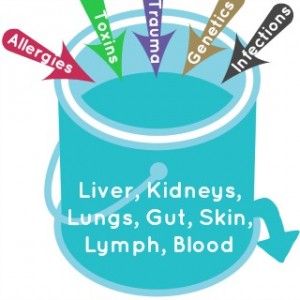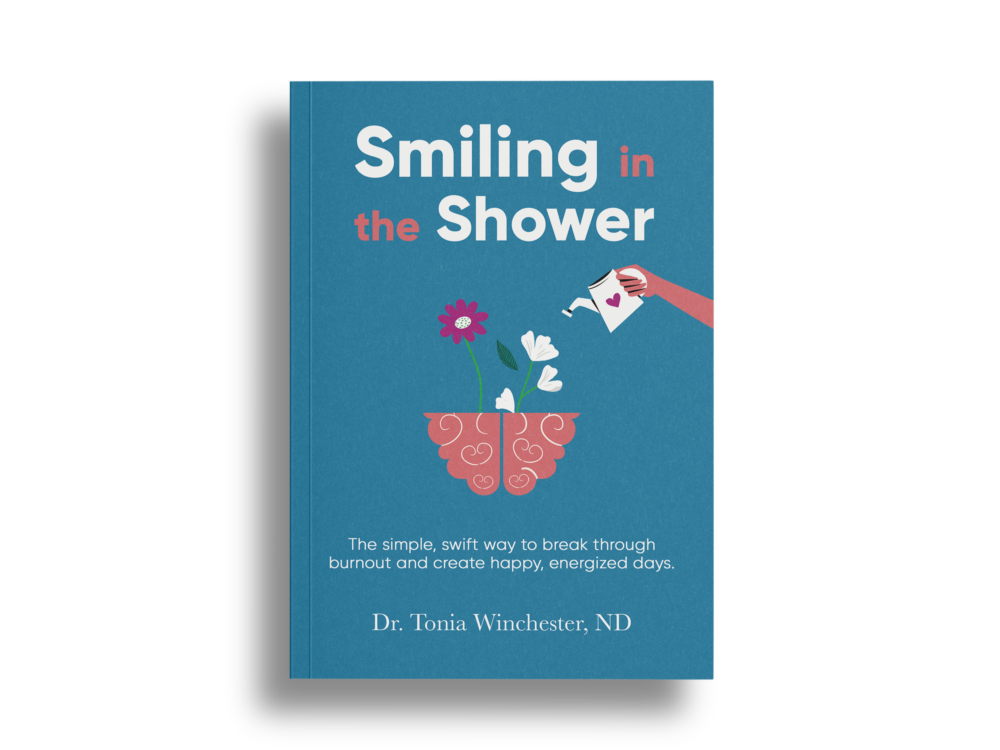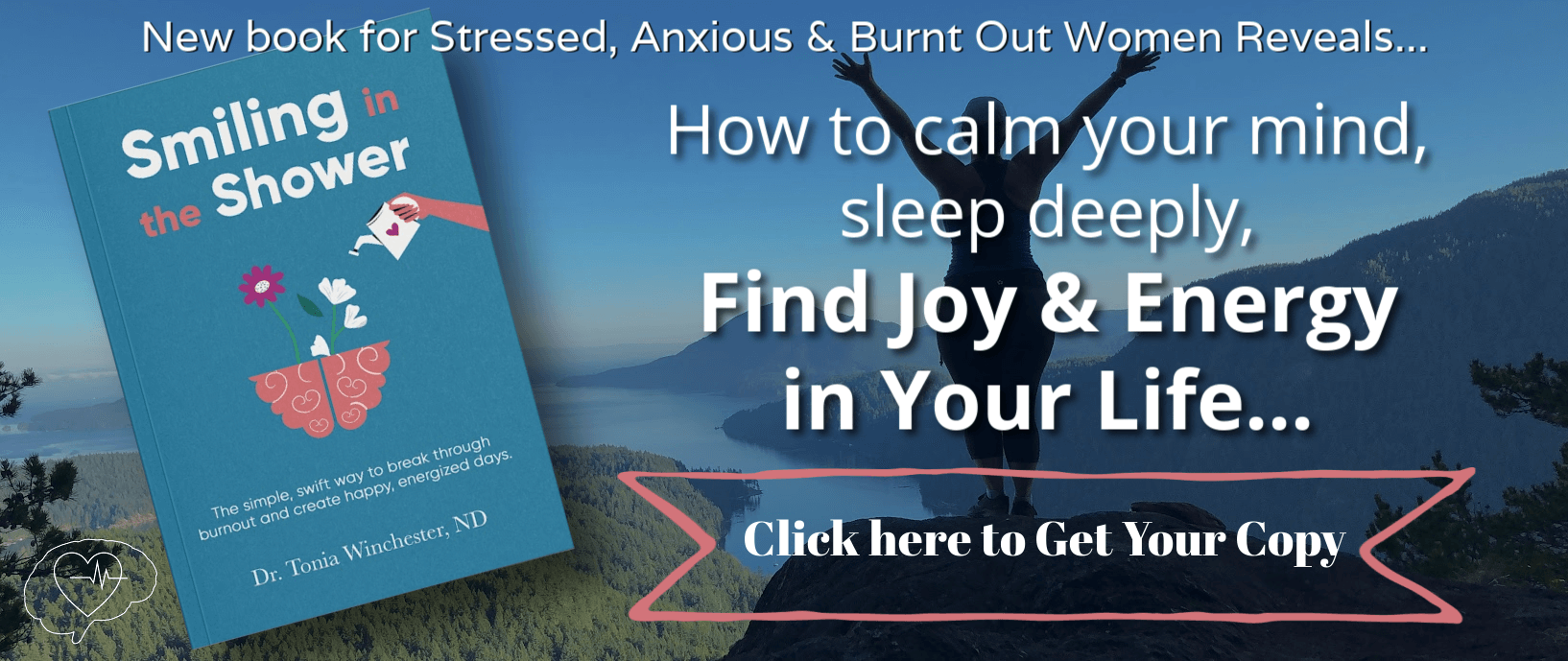John Mayer thinks your body is a wonderland.
And I don’t disagree. Sexy or not, our bodies are amazingly fascinating! That’s part of why I love my work. But I also think of the body as a bucket. Less glamorous I know, but an extremely functional analogy.
Run with me here.
Lets say the body is a bucket.
The bucket itself represents your amazingly-fascinating-wonderland-body and all it’s biochemical and physiological wonderland molecules, processes, and reactions. Key players here are your liver, lungs, gut (digestive system,) kidneys, skin, lymph and blood. They are in charge of managing, detoxifying and eliminating what fills up your bucket. At the bottom of the bucket is an out spout which releases sweat, stool, urine, breath, mucus, and several other body fluids.
With me so far?
You’re right. You need a visual. On it.

(It’s too pretty not to tweet.)
Ideally our bodies are born as an empty bucket. Unfortunately this isn’t the actual case. The Environmental Working Groups says that babies are being born with 280 DIFFERENT chemicals in their bloodstream. Yikes. Anyhoo, I digress.
We start with our genetics and as we go through life we collect stuff in our buckets. We gather:
Allergies: foods, environmental pollens or animal dander, drugs or supplements.
Toxins: from the food we eat, the things we touch, the air we breathe, and the water we drink – toxic exposure is not to be taken lightly.
Traumas: emotional or physical abuse, injuries, or accidents, heartbreak, or lost loved ones.
Infections: viruses, parasites, fungi, bacteria – we can pick up these little critters anywhere.
The common denominator between all these factors?
If the bucket is functioning well the body will be healthy. But the normal physiology can break down if:
1. the body is not able to meet the demands of the bucket being filled up (often due to genetic or lifestyle factors)
2. the bucket is being filled at a rate which exceeds the body’s ability to process and eliminate the filling-up factors.
Keen eye. Numbers 1 and 2 above are really the same thing.
If this pattern continues, one day the bucket will overflow. And we see symptoms or states of disease. This is when my patients find their way to my office.
“All of a sudden I have ________.”
In my opinion your symptoms, although they seem to have appeared “suddenly” have likely been building up for a while. Drop by drop. Your bucket has been filling up. Trauma by trauma. Toxin by toxin. Etc by etc.
You say,
“I can’t handle it.” Your bucket is literally too full to lift or handle.
“I’m overwhelmed.” Your bucket is overflowing.
The goal of my work with my patients is twofold.
1. Decrease exposure to bucket-fillers.
2. Improve the bucket functions such as detoxification, processing and elimination.
The rest of this article will address the 2nd option. I’ve touched on the exposure factor here and here.
Introducing the Lifestyle SUPER 7.
You need to:
1. Eat properly
2. Drink properly
3. Move properly
4. Eliminate properly
5. Breathe properly
6. Sleep properly
7. Think properly
I know. That’s a lot to keep track of. And there is a lot of overlap between categories. I could write a book on EACH of these topics. So in this short article I’ll provide a few simple tips (or links to articles where I’ve already provided a few simple tips.)
1. Eating properly
This is a biggie. Here are a couple places I’ve covered it:
11 Ways to Eat More Veggies Than You Thought Humanly Possible.
7.5 Tips to Supersize Your Nutrition WITHOUT Increasing your Waistline
2. Drinking properly
You need to drink enough and it needs to be clean. How much is enough? Take your weight in pounds, divide by 2, that becomes the number of ounces that is ideal for you. Caffeinated bevies don’t count and neither does juice. Your tap water has 50 different bucket-filling chemicals in it. Filter wherever possible. I love Santevia filtration systems if you’re looking for a suggestion.
3. Move properly
You don’t need to be an athlete to get what your body needs from exercise. Don’t get intimidated by the word exercise. Lets say movement. It helps your circulation, your lymph and your skin empty your bucket. Find something fun that you love doing and do it as often as you can. Thirty minutes per day or even every other day. You can do this. Your bucket will be ever grateful.
4. Eliminate properly
I definitely covered this one here: How to Poo More, If You’re Not Pooing Enough.
5. Breathe properly
We often overlook the importance of this. We need to breath deeply. Into the belly. At least 100 times per day. And before bed if you’re having trouble sleeping. And during the night if you’re waking up. And before meals if you have trouble with your digestion. And. And. And. This is such a good bucket emptier. So good.
6. Sleep properly
I touched on a couple factors that relate to this one in these two articles:
How to Know If You’re Consuming Too Much Caffeine
The Number One Secret to Sleeping 8 Hours a Night Like a Champ
7. Think properly
As much as all the above bucket optimizers excite me, this is by far my favorite way to work with people. So much of what goes on in our body is directed by our subconscious mind. It is estimated that 90-95% of how our buckets respond to environment is governed here. Often we need to change our mindsets, release old limiting idea of how the world functions, or purge old memories. All these things are just biochemistry and they clog up the bucket cogs like crazy. My favorite tool for this? Brain-Based Transformation coaching
And with the realization that I’ve likely created your mental bucket to overflow, I’m going to sign off. In the comments below tell me which of the Lifestyle super 7 are you going to focus one? What is one step you can take to help your bucket empty or function better?
Here’s to your jivin’ Health & thrivin’ Life,
Dr. Tonia
**Although delicious, I have a hard time fitting gravy into the Lifestyle Super 7.








